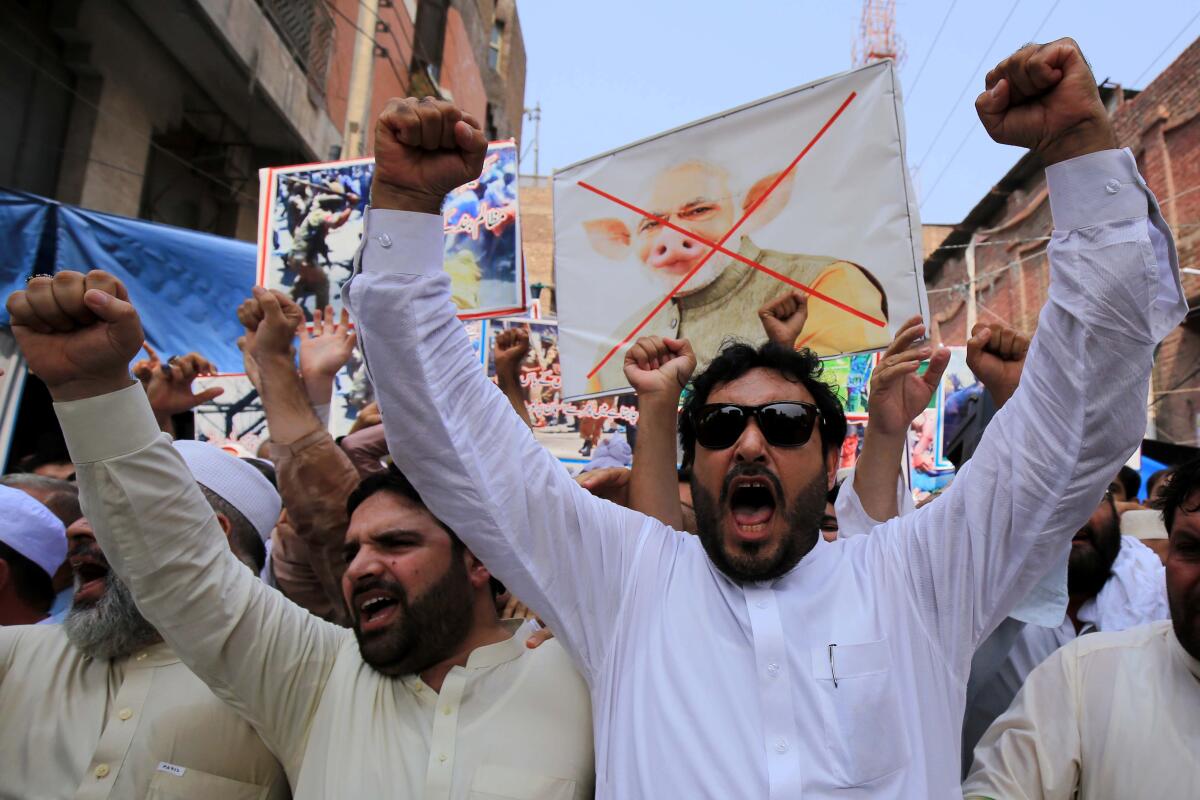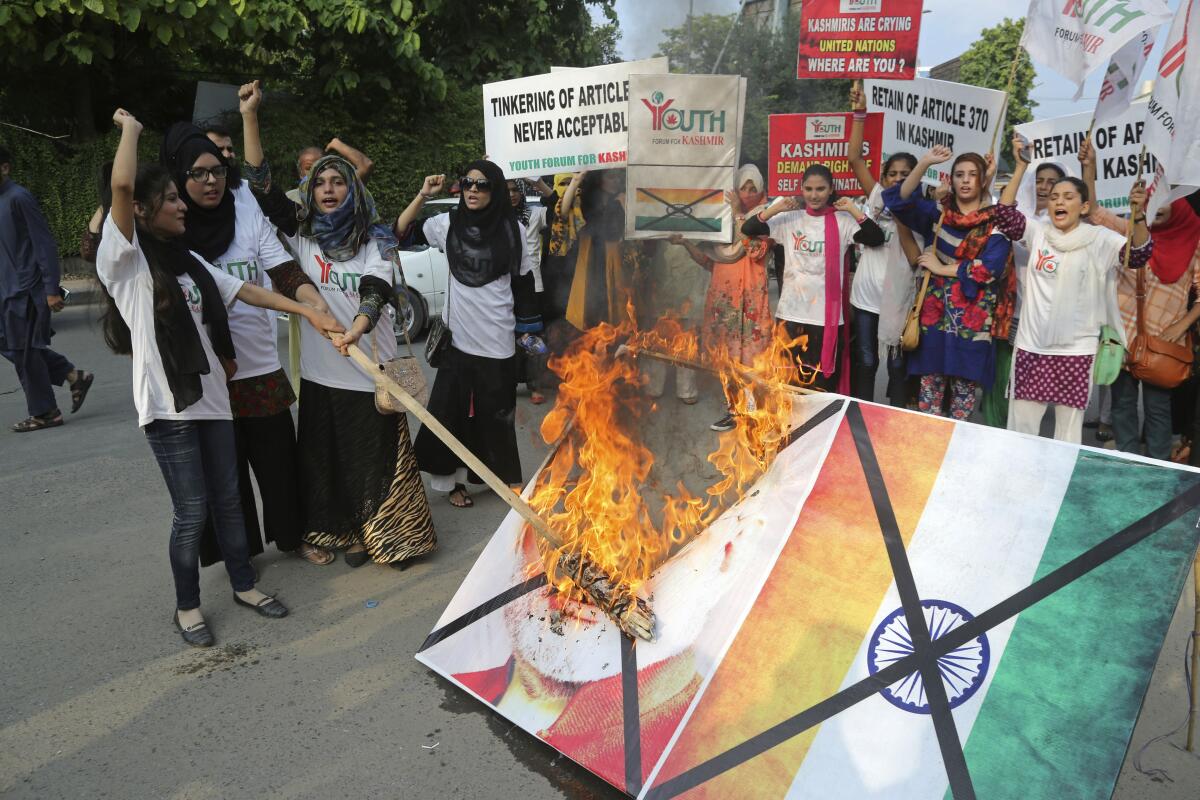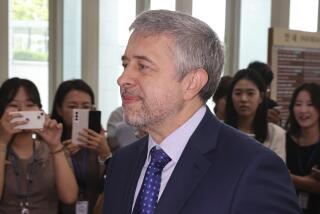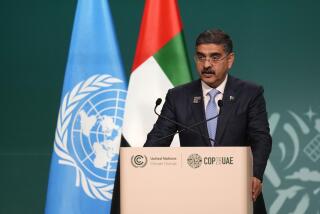Pakistan punches back at India over Kashmir, downgrading diplomatic ties and suspending trade

- Share via
JAMMU, India — The political crisis over the disputed territory of Kashmir escalated Wednesday when Pakistan said it would downgrade its diplomatic ties with India, expel the Indian ambassador and suspend bilateral trade with its regional rival.
Indian authorities have clamped a complete shutdown on Muslim-majority Kashmir as the Hindu-led nationalist government in New Delhi scrapped the region’s statehood and special status, including the right to its own constitution.
As the security lockdown by Indian troops continued in Kashmir for a third day, hundreds of migrant workers began the long trek back to their villages in northern and eastern India.
The Kashmir region is divided between India and Pakistan, and is claimed by both. The two nuclear-armed neighbors have fought three wars, two of them over control of the mountainous region, since they won independence from the British in 1947.
Kashmir is India’s only Muslim-majority state, and most people there oppose Indian rule. Insurgent groups have been fighting for Kashmir’s independence from India or its merger with Pakistan since 1989.
The Indian government has shut off most communications, including internet, cellphone and landline networks, with Kashmir. Thousands of additional troops were sent to the already heavily militarized region out of fear the government’s steps could spark unrest.
In response to India’s action, Pakistani Foreign Minister Shah Mahmood Qureshi told parliament that it would expel the Indian ambassador, and the Foreign Ministry later said India had been instructed to withdraw the envoy. The decision came at a meeting of Pakistan’s National Security Committee led by Prime Minister Imran Khan and attended by the heads of the armed forces and senior government officials.

Khan told the meeting that his government would use all diplomatic channels “to expose the brutal Indian racist regime” and human rights violations in Kashmir, the government statement said.
Khan also directed Pakistan’s armed forces to remain on maximum alert.
Islamabad also said it would review other aspects of its relations with India. It said it would ask the U.N. to pressure India to reverse its decision to downgrade Kashmir from a state to two separate territories. The region also lost its right to fly its own flag and make many of its own decisions.
Pakistan said it would continue extending diplomatic, political and moral support for people living in Kashmir and their “right of self-determination.” Pakistan has long called for people in the Indian-controlled part of Kashmir to be allowed to vote on whether they want to sever ties with India.
Sharat Sabharwal, a former Indian ambassador to Pakistan, played down Islamabad’s moves, calling them “very symbolic measures.”
“Downgrading of diplomatic ties has happened in the past. You maintain your [diplomatic] missions, but at a lower level. The contacts are on. As far as suspending trade ties with India is concerned, India already has withdrawn most-favored-nation status to Pakistan and imposed customs duties of 200% on Pakistani products. Pakistan will be hurting itself as it needs machinery and other products from India,” he said.
Earlier, Pakistani lawmakers in a joint session of parliament denounced the action on Kashmir by Indian Prime Minister Narendra Modi. The changes include lifting a ban on property purchases by nonresidents of Kashmir, opening the way for Indians outside the territory to invest and settle there. The Muslim population worries that such measures would change Kashmir’s demography, culture and way of life.
Qureshi said he feared “genocide and ethnic cleansing” by India in Kashmir.
“God willing, one day Kashmir will become Pakistan,” he said.
The lawmakers later unanimously approved a resolution condemning the action, saying that as a disputed territory, no change in its status could be made by New Delhi under U.N. resolutions on Kashmir. It also asked India to reverse the changes, lift an indefinite curfew and release all detainees in Kashmir.
India has accused Pakistan of arming and training insurgents fighting for Kashmir’s independence from India or its merger with Pakistan. For its part, Pakistan denies the charge, saying it offers only diplomatic and moral support to the rebels.
In the city of Jammu, the winter capital of Jammu and Kashmir state, workers carrying their belongings tied in bedsheets crowded a railway station as they sought to leave the region on trains bound for Uttar Pradesh, Bihar and Jharkhand in India’s north and east. Some complained their Kashmiri employers didn’t pay them their salary as security forces imposed tight travel restrictions over the weekend and asked them to leave their jobs.
Laborer Jagdish Mathur said many people walked or hitched rides on army trucks and buses from Srinagar to Jammu, a distance of 160 miles (260 kilometers).
“We haven’t eaten properly for the past four days,” Mathur said, adding that he didn’t have money to buy a rail ticket to his village in eastern Bihar state. “The government should help me.”
Surjit Singh, a carpenter, told a New Delhi TV broadcaster that he was returning home because of the security lockdown.
Every year, tens of thousands of people travel to Kashmir from various Indian states seeking work, mainly in masonry, carpentry and agriculture. Whenever the security situation deteriorates, they return home.
Protests over the Indian government’s actions broke out in Kargil, a Muslim-majority border city in Ladakh that identifies culturally with Kashmir. India and Pakistan fought a war there in 1999.
The mountainous area comprises three regions: Hindu-majority Jammu, Muslim-majority Kashmir, and heavily Buddhist Ladakh, which borders Tibet to the east and the Chinese territory of Xinjiang in the far north.
Kargil’s religious and political organizations condemned the Indian government for acting “without the consent from the people.” Schools and shops were closed Tuesday, and streets were empty except for a group of demonstrators who marched and shouted slogans decrying the separation of Ladakh.
Sheikh Sadiq Rajai, chairman of the influential Imam Khomeini Memorial Trust, told The Associated Press on Wednesday that India’s move was “an attack on our identity. This decision will disempower our people.”
Former Kargil lawmaker Asgar Ali Karbali called the move to divide the region “a black day in the history of India.” Karbali said he didn’t accept the decision and that others in Kashmir wouldn’t either.
Residents of Kargil worried the decision could lead to a flood of people from outside the region overtaking their pristine landscape.
“Our jobs are in danger. Now people from India will come here and settle. Our jobs will go to them. We were never consulted before India took this decision,” Ghulam Mustafa said.
More to Read
Sign up for Essential California
The most important California stories and recommendations in your inbox every morning.
You may occasionally receive promotional content from the Los Angeles Times.










